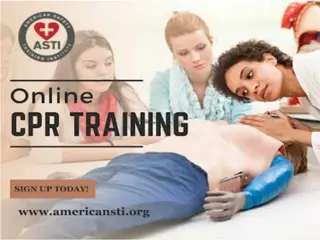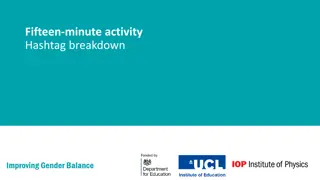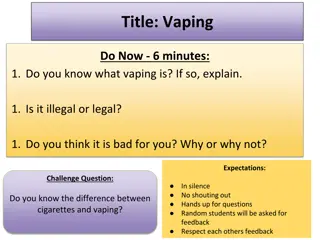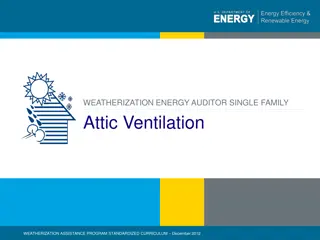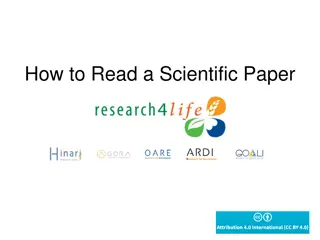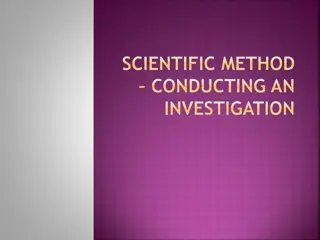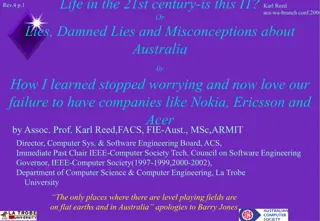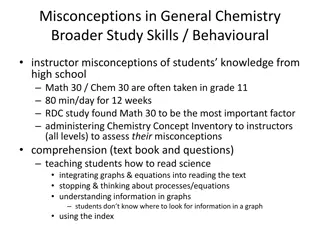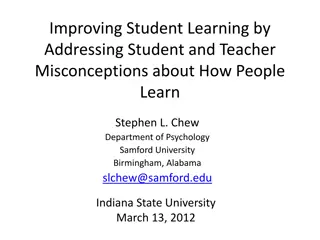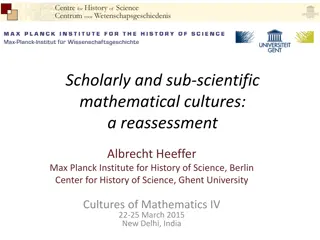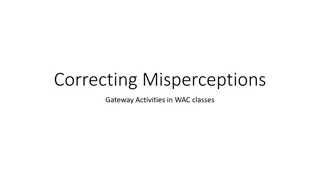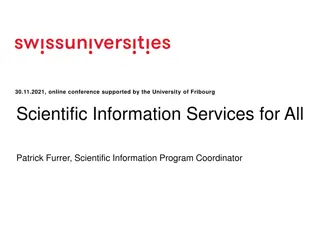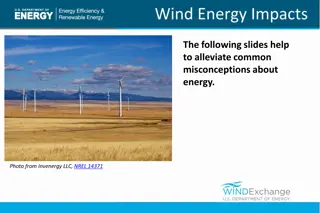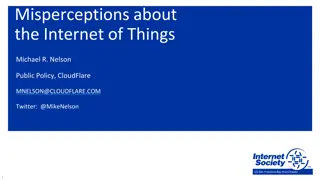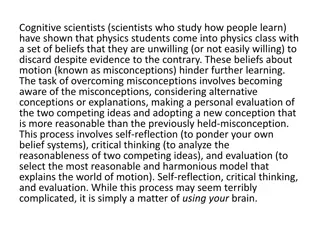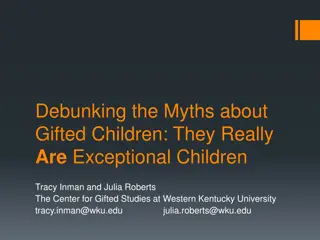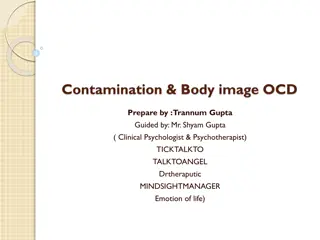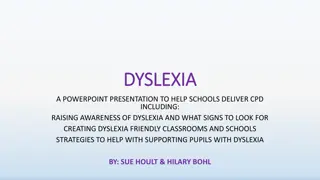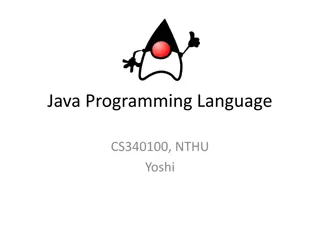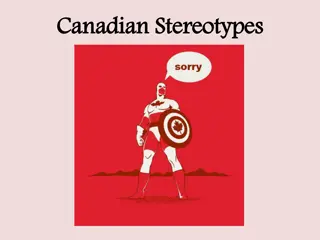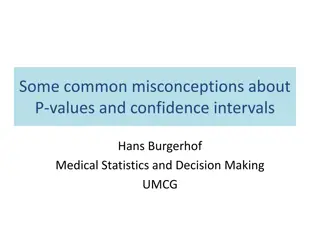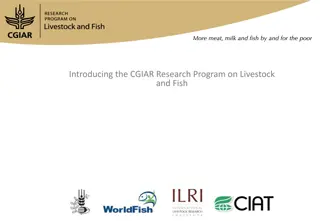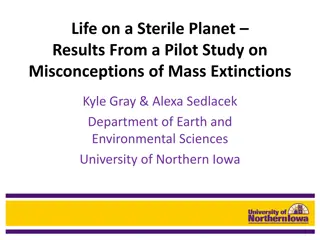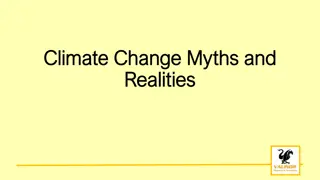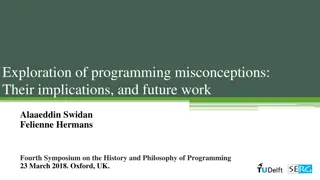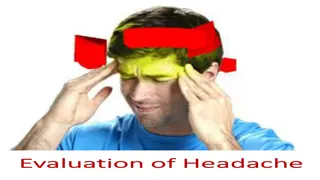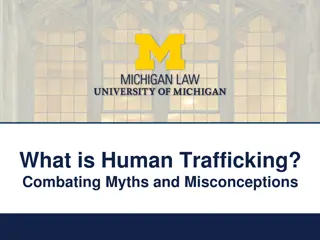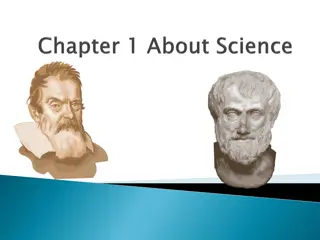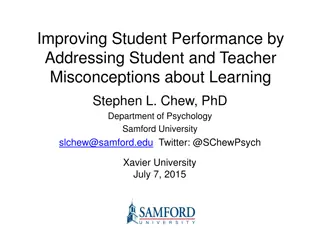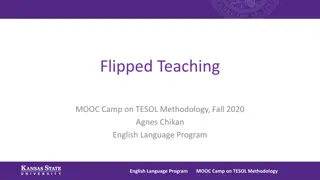Enhancing Scientific Literacy in Early Years Play-Based Learning
This PhD research proposal explores scientific literacy among children in play-based learning, focusing on everyday concepts and their application to scientific understanding. The study aims to implement Vygotsky's sociocultural theory to enhance children's scientific literacy through Vision 1 and V
7 views • 19 slides
Exploring the PROTEOCURE COST Action: Targeting Proteolysis for Proteome Remodeling
The PROTEOCURE COST Action focuses on targeting proteolysis for proteome remodeling, aiming to enhance Europe's scientific and technological capacity through collaboration across various fields and career stages. Participating in this initiative offers financial support, scientific networking, and c
0 views • 17 slides
5 Common Misconceptions About Health and Safety
Misinformation is everywhere! So we at Storage Equipment Experts feel like it\u2019s high time to do some health and safety myth busting. If there\u2019s one consistently popular \u2014 and usually inaccurate \u2014 news story, it\u2019s the one about health and safety \u201cgoing too far\u201d. Aft
3 views • 3 slides
Myth-Busting: Common Misconceptions About CPR
When it comes to CPR (Cardiopulmonary Resuscitation), many people are under the impression that it\u2019s only for medical professionals or that it\u2019s too complicated to learn. But these misconceptions can be a matter of life and death.\n\nFor more info visit: \/\/ \/courses.php
1 views • 5 slides
Understanding Feminism, Sexism, and Toxic Masculinity - A Reflection on Gender Equality
Explore the concepts of feminism, sexism, and toxic masculinity through activities and discussions, challenging misconceptions and promoting gender equality. Reflect on learning and origins of misconceptions to foster a more inclusive society.
0 views • 7 slides
Understanding Vaping: Risks and Misconceptions
Vaping, the inhaling of vapor from electronic cigarettes, raises concerns due to unknown long-term effects and reports of serious lung damage. The difference between smoking and vaping lies in nicotine delivery methods. Misconceptions around vaping being healthy are debunked through discussions on i
1 views • 18 slides
Comprehensive Guide to Attic Ventilation for Weatherization Energy Auditors
Explore the purpose, principles, and misconceptions surrounding attic ventilation in single-family homes as part of a weatherization assistance program. Learn about common misconceptions, post-weatherization moisture problems, and passive attic venting techniques using informative visuals provided b
0 views • 23 slides
Guide to Reading Scientific Papers
Understanding how to read a scientific paper is crucial for researchers and students alike. This guide covers the types of scientific papers, organization of a paper, and the key steps to properly read and comprehend complex scientific information. It explains the different sections of a paper, such
0 views • 20 slides
Understanding the Scientific Method: A Comprehensive Guide
Exploring the scientific method and principles of scientific investigation, this guide covers the mindset of a scientist, steps in the scientific method, and key components like formulating questions, conducting research, creating hypotheses, performing experiments, and analyzing results. It emphasi
1 views • 21 slides
Understanding Nurse Triage: Common Misconceptions and Legal Issues
Explore the world of nurse triage with insights on misconceptions, legal considerations, and the crucial role of teletriage nurses. Learn about risk mitigation, the nurse's scope of practice, and the importance of communication in teletriage encounters.
0 views • 30 slides
Understanding Operations Research: Misconceptions and Real-World Applications
Operations Research (O.R.) is often misunderstood as just a collection of mathematical tools, but it is actually a systematic approach to problem-solving using analytical techniques. This article addresses common misconceptions about O.R. and highlights its broad scope in tackling real-world issues.
0 views • 12 slides
Addressing Stigma and Breaking Down Misconceptions about SNAP
Addressing stigma surrounding SNAP is crucial to ensure all eligible students can access this valuable resource. Stereotypes and misinformation often prevent individuals from utilizing SNAP benefits. By promoting positive messaging, correcting misinformation, and sharing personal stories, we can cha
3 views • 11 slides
Life in the 21st Century: IT, Lies, and Misconceptions about Australia
Delve into Assoc. Prof. Karl Reed's insightful take on the state of life in the 21st century, focusing on the role of IT, misconceptions about Australia, and the failures in developing companies like Nokia and Acer. Explore the impact of technology on society, economy, and workforce, reflecting on t
3 views • 33 slides
Overcoming Misconceptions in Chemistry Education
Addressing misconceptions in general chemistry education, focusing on student knowledge from high school Math and Chemistry courses. Emphasis on student motivation, learning strategies, and common misconceptions in understanding scientific concepts. Strategies for enhancing comprehension, applicatio
0 views • 12 slides
Addressing Misconceptions in Teaching and Learning
Explore how misconceptions about learning impact teaching effectiveness and student performance. Learn how cognitive research can enhance teaching methods. Discover the importance of accurate knowledge for effective teaching. Identify common beliefs that hinder teaching effectiveness and student lea
0 views • 40 slides
Reassessing Scholarly and Sub-Scientific Mathematical Cultures
Scholarly and sub-scientific mathematical cultures are reevaluated through the works of Jens Hoyrup, focusing on the organized nature of sub-scientific knowledge. The distinction between theoretical and practical knowledge, applications to mathematical cultures, and misconceptions related to the sup
0 views • 53 slides
Misconceptions Surrounding Wahhabism and Muhammad ibn Abdul Wahhab in the Malay Muslim Community
The article delves into the misconceptions and conflicts between Wahhabism and Malay Sunni beliefs, highlighting the lack of understanding about the origins of Wahhabism. It explores the differences between Wahhabis and Sunnis, shedding light on the life of Muhammad ibn Abdul Wahhab and his teaching
0 views • 12 slides
Addressing Misconceptions in Writing Across the Curriculum (WAC) Classes
WAC approaches in geology classes aim to correct persistent misconceptions through gateway activities, focusing on topics like CFCs and ozone depletion. By engaging students in discussions and written responses, educators correct prior misunderstandings to enhance learning outcomes and clarify disti
0 views • 6 slides
Scientific Services for All - Enhancing Scientific Information and Services
This online conference, supported by the University of Fribourg, focuses on providing scientific information and services for all. Led by Patrick Furrer, the Scientific Information Program Coordinator, the event delves into creating a network of services, developing a coordination structure, and sho
0 views • 12 slides
Alleviating Misconceptions About Energy: Wildlife Impacts, Bird Mortality, Human Health, and Shadow Flicker
These slides address common misconceptions about energy, focusing on wildlife impacts, bird mortality from wind turbines, human health effects, and shadow flicker concerns. They highlight strategies to reduce wildlife impacts, comparisons of bird mortality with other structures, lack of evidence for
0 views • 9 slides
Debunking Misconceptions about the Internet of Things
Delve into the world of the Internet of Things (IoT) with Michael R. Nelson as he challenges myths, explores key policy issues, and identifies necessary actions in the San Francisco Bay Area. From debunking common misconceptions to outlining crucial policies and decision-making landscapes, this insi
0 views • 10 slides
Understanding Physics Misconceptions and Newton's Laws
Cognitive scientists have shown that physics students often hold misconceptions about motion that hinder their learning. Overcoming these misconceptions involves self-reflection, critical thinking, and evaluation. Newton's laws of motion play a significant role in understanding the concepts. Questio
0 views • 56 slides
Debunking Myths About Gifted Children
Debunking the common myths surrounding gifted children, this presentation challenges misconceptions and emphasizes the importance of effort, growth mindset, and individualized support in nurturing their talents. It showcases insights from experts in the field and addresses key misconceptions about g
0 views • 26 slides
Fusion Science Department Enabling Research Projects 2021-2023
The Fusion Science Department Enabling Research Projects for 2021-2023 focus on developing novel fusion-relevant scientific and technological ideas. These projects, led by Principal Investigators, are distinct from main work packages and involve scientific planning, team collaboration, and resource
0 views • 11 slides
Understanding Contamination OCD: Symptoms, Obsessions, and Misconceptions
Contamination OCD is a subset of OCD characterized by severe fears of becoming contaminated by germs or getting sick. Individuals with this condition may exhibit compulsions such as avoidance, excessive washing, and health testing. It's crucial to differentiate between normal intrusive thoughts and
0 views • 21 slides
Understanding Dyslexia: Facts, Signs, and Strategies for School Support
Dyslexia is a common learning difficulty that impacts word reading and spelling skills. This presentation by Sue Hoult & Hilary Bohl explores the prevalence of dyslexia in classrooms, its characteristics, familial links, early intervention benefits, and misconceptions to dispel. Highlighting varied
0 views • 54 slides
Understanding Java Programming: Common Misconceptions Debunked
Explore and debunk common misconceptions about the Java programming language, from its relation to other languages and performance comparisons to memory management and real-life applications. Uncover the truths behind these myths to gain a clearer understanding of Java's capabilities and versatility
0 views • 16 slides
Canadian Stereotypes: Debunking Common Misconceptions
Explore and debunk various Canadian stereotypes in this collection of images and references, from the misconceptions of being overly polite and obsessed with hockey to myths about lumberjacks, pronunciation, wildlife, and cultural affiliations with America. Delve into the humor and reality behind th
0 views • 21 slides
Understanding Common Misconceptions About P-Values and Confidence Intervals in Statistics
Explore common misconceptions surrounding P-values and confidence intervals in statistical analysis through lunchtime lectures at UMCG. Gain insights on theory, frequentist statistics, and deciphering statements about statistical methods. Challenge your understanding with true/false statements and d
0 views • 24 slides
Understanding Physics Misconceptions and Newton's Laws
Cognitive scientists have identified common misconceptions physics students hold about motion, hindering their learning process. Overcoming these misconceptions involves self-reflection, critical thinking, and evaluation. Concepts such as force, motion, and Newton's Laws are explored to help student
0 views • 51 slides
Accelerating Livestock and Aquaculture Development for Poverty Reduction
The CGIAR Research Program on Livestock and Fish aims to address the challenges and misconceptions surrounding livestock and aquaculture development. It focuses on increasing productivity in small-scale systems to benefit the poor and improve food security. The program seeks to correct misconception
0 views • 27 slides
Insights from Pilot Study on Mass Extinctions Misconceptions
Study by Kyle Gray and Alexa Sedlacek at University of Northern Iowa delves into misconceptions of mass extinctions. The research explores the scientific definition, contributing factors, and demographics related to mass extinctions based on a pilot study among students. Key findings include first l
0 views • 21 slides
Climate Change Myths and Realities: Debunking Common Misconceptions
This content discusses common myths surrounding climate change and provides evidence-backed realities to debunk them. Topics include the pause in warming, natural climate variability, misconceptions about climate models, the impact of CO2 on plant life, and the consensus among climate scientists. Th
0 views • 6 slides
Uncovering Misconceptions in Programming Education
Delve into the realm of misconceptions in programming education, exploring their implications and offering insights for future research. Discover the roots of these misunderstandings, their impact on computer science learning, and strategies to address and rectify them.
0 views • 23 slides
Understanding Headaches: Types, Misconceptions, and Management Guidelines
Headaches are a common medical complaint affecting a significant portion of the population. This presentation delves into the various types of headaches, addresses common misconceptions such as sinus headaches and eye strain, and provides guidelines for the primary care management of headaches in ad
0 views • 54 slides
Understanding the Scientific Method: Pre-Test and Daily Agenda
Explore the process of science with a pre-test on the scientific method, followed by a detailed daily agenda covering activities like bell-ringers, reviews, and experimental design. Understand the nature of science, scientific reasoning, and the importance of variables, groups, and constants in inve
0 views • 51 slides
Understanding Human Trafficking: Dispelling Myths and Misconceptions
Learn about human trafficking and how myths and misconceptions impact victims. Explore the work of The Human Trafficking Clinic in providing legal aid to victims of labor and sex trafficking. Understand the global prevalence of human trafficking and where it occurs. Discover facts about victims and
0 views • 23 slides
Evolution of Scientific Thought and the Scientific Method
Explore the evolution of scientific theories and methodologies through the works of influential figures like Aristotle, Copernicus, Galileo Galilei, and Francis Bacon. From the geocentric beliefs of Aristotle to the heliocentric model proposed by Copernicus, witness the shift in paradigms and the em
0 views • 14 slides
Understanding Student and Teacher Misconceptions in Learning
Addressing common misconceptions about learning can improve student performance. This session explores cognitive principles for effective learning and teaching, including the impact of teacher and student beliefs on learning outcomes. Insights into college student readiness and challenges are also d
0 views • 50 slides
Exploring Flipped Teaching in TESOL Methodology
Dive into the innovative teaching approach of flipped classroom methodology within the context of Teaching English to Speakers of Other Languages (TESOL). Understand the differences between traditional lesson structures and the benefits, misconceptions, and challenges associated with flipped teachin
1 views • 19 slides



